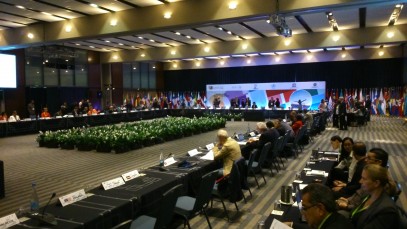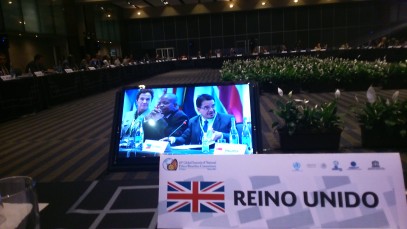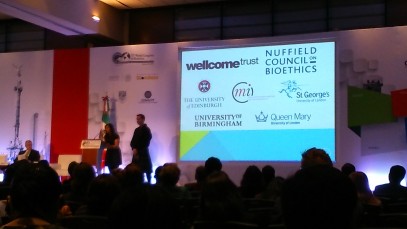Blog post
June in Mexico City: Global Bioethics
Part 1 - The Global Summit
It’s over a fortnight since I got back from Mexico City, where I had a busy week at the Global Summit (of National Ethics Committees) and the World Congress (of the International Association of Bioethics). If they sound like pretty grand events, they do sometimes look that way too. Here is the set-up for the Global Summit:

In all honesty, the room is not really conducive to effective discussion, but it was nevertheless notable that there were 130 people there, representing national ethics advisory bodies from 60 countries, with all six WHO regions being well represented. If discussion was sometimes inhibited by the room layout, we nevertheless usefully covered a lot of ground. There were talks based on collaboratively prepared papers on universal healthcare, emerging health technologies, vulnerability, and the role and function of national ethics committees (NECs). I presented our recent work on novel neurotechnologies and our current work on children and clinical research, and gave a ‘market place’ demonstration of some of the materials that we have produced for (and with) young people. All went down very well, and (without wishing to seem boastful) I think we are clearly maintaining our established place at the heart of this global community:

One of the most notable things to emerge from the meeting was the broad recognition that NECs (and we qualify as one for these purposes) can and do take many forms, each being quite unique in their context, constitution, form and scope. Nevertheless, they share many common challenges. Specifically, all are concerned about:
- maintaining independence (of Government or funders) whilst achieving influence;
- bridging academic/policy/public/media spaces;
- bridging local/national/international perspectives;
- engaging wider audiences and contributors; and, of course,
- securing sustainable resources.
One of the really valuable things about these meetings is the way they have been able to assist the development of new committees in countries where resources are particularly scarce. Often the people involved can feel isolated and unsupported locally, and to have access to a network of colleagues who have such a variety of experience and expertise is of real value. But it is not a one-way street – those of us in countries with long-established committees can learn equally from the different perspectives of our neighbours, as well as from their resourcefulness, creativity and commitment. (I am reminded here of Nigel Crisp’s observations in his nice book, and project, Turning the World Upside Down.)
As ever, it was a pleasure and a privilege to represent the Council on such an occasion, and our hosts at Conbioetica deserve our warm thanks and congratulations.
Part 2 – The World Congress (ft. Graeme’s kilt)
The second half of my week in Mexico City was taken up with the IAB World Congress, an event attracting over 1200 people from all over the globe. I didn’t get to see as much as I would have liked as I had Symposium presentations to give on our current children and clinical research project, and another based on our 2007 public health report (nice to share a platform with our old friend and colleague Harald Schmidt, who bears much of the credit for that report). I also chaired a nice session on the control, management and use of tissue and data, inevitably one of the hot topics of the moment (we have our own project running on biodata, of course). So I had a proper busy time, and if there is still anyone out there who thinks travelling to conferences is for fun…. well, honestly it is not. Having said that, it was nice to be there on the evening that Mexico beat Croatia to progress from the group stage at the World Cup, though even that was curtailed as torrential rain sent everyone back to celebrate a la casa instead of in the streets (which massed police continued to patrol regardless).
But it was a good opportunity to learn, to catch up with old contacts (travelling 12 hours to see your near neighbours….), and also to make new ones. Fortunately, for me as the Director of the Nuffield Council, making new contacts is really rather easy – it is extraordinary how well known we are on the international bioethics scene. Other colleagues have observed that no matter where in the world they pitch up (on work-related business, I should add), people want to talk to us and get us involved. We are lauded, and told how much our reports are valued, read and used. It feels pretty good when, on such occasions, with any intervention I or my colleagues make, we are introduced simply as being from ‘The Nuffield’. And everyone knows what that means.
Talking of colleagues from ‘The Nuffield’, it was very good to see Council member Graeme Laurie in Mexico. Apart from his papers and other contributions, he was there to announce the successful Edinburgh bid to host IAB 2016. And really that, for me, was the highlight of the week, not least because Graeme was in his kilt, which swayed fabulously as he moved to the sounds of the Mexican bagpipe band that accompanied the presentation. And ‘The Nuffield’ is particularly proud to be associated, alongside others, as a sponsor of IAB2016, as you can see from the picture below (if you can manage to take your eyes from Graeme in his kilt…)

Comments (0)
Join the conversation